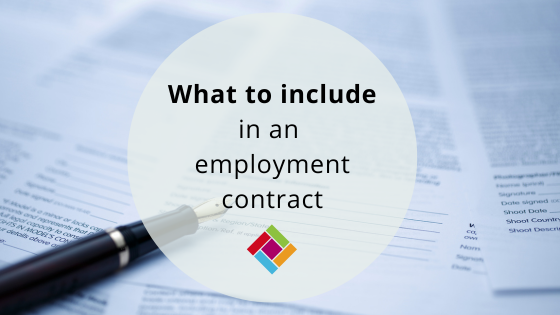
When hiring your first employee, the most important piece of documentation is the employment contract. Without it, your business is exposed and could be vulnerable to disputes and issues in the future. So what needs to be included in an employment contract?
An employment contract also provides your employees with peace of mind and reassurance about their role and your business.
Legally, all employees should have written terms between themselves and their employers. This was confirmed as part of the government’s ‘Good Work Plan 2020’ with the aim of providing transparency for employees.
What are contract terms?
It is not in itself a contract but is evidence of a contract and it does set out the basic information that both parties need to know. All employees are entitled to this if their contract lasts at least one month or more. The written statement sets out expectations and gets you off to a great start.
It should include:
- Employer and employee names
- Start date of employment
- Job title with description
- Details of pay
- Hours and location of the workplace
- Holiday allowance
- Notice period
- Pension scheme (see auto-enrolment below)
Create or template?
Employment contract templates can be downloaded from online sources such as ACAS or you can contact an HR consultancy like ourselves, to create a compliant and bespoke template specifically for your business. If you’re looking for more detailed clauses such as post-termination restrictions, mobility (ability to relocate an office), deductions from wages, intellectual property or to cover a more complex remuneration package, perhaps made up of commission or bonuses, then you will need a bespoke contract and will need to outsource this to a third party.
When does an employment contract become valid?
The contract starts as soon as the employee starts work, and by starting work the employee has effectively accepted the terms of conditions on offer. Employees and employers must stick to a contract until it ends (for example, by an employer or employee giving notice or an employee being dismissed) or until the terms are changed (usually by agreement between the employee and employer).
What to include in an employment contract: next steps
Once your new employee has accepted your offer and signed their employment contract, and you have become an employer for the first time, there are a few other items you may need to think about. Firstly, Workplace Pensions Auto-enrolment. Following changes to the pension rules, all employers need to give their employees the option to join a workplace pension scheme.
Many small companies opt to work with an Independent Financial Adviser to set up their Workplace Pension. Others may subscribe directly to NEST, the National Employment Savings Trust which was set up by the government to make sure that every employer would have access to a high-quality workplace pension scheme for auto-enrolment. Even if you just employ one person, you must provide a workplace pension for your employee. The Pensions Regulator has a useful guide available to download for free.
Download our free Employers-Guide-to-Hiring-and-Managing-Staff.pdf (529 downloads ) .